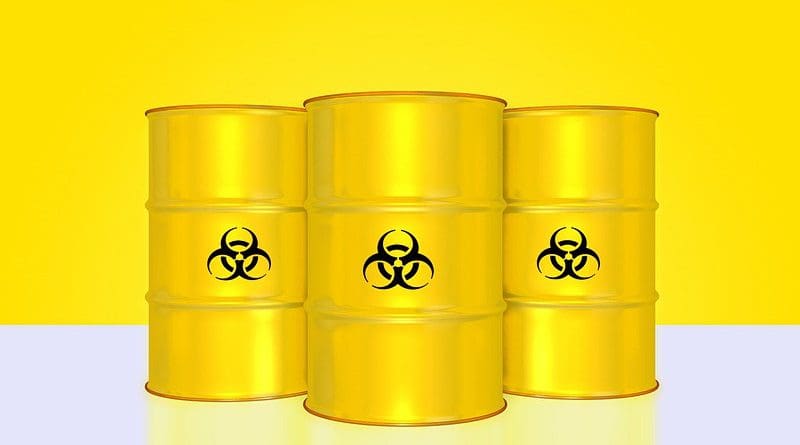Regressing Nuclear Security Culture In India: Increasing Incidents Of Nuclear And Radiological Theft – OpEd
In month of August, Indian authorities reported seizure of radioactive element californium. This is the third event of theft, smuggling and illicit sale of nuclear and radiological material in India in ongoing year. First event of seizure was reported in month of May, where over 7 kg of uranium was seized from an individual and second such incident was reported in month of June, where over 6 kg of uranium was seized. These developments are concerning because they not only indicate the existence of black-market in India but also shows the regressing nuclear security culture in India.
Nuclear security is not just referred to the security of nuclear weapons and facilities but it also refers to the prevention, detection and response to activities like theft, sabotage, unauthorized access, illegal transfer of nuclear and “other radioactive substances”. International organizations like IAEA are only responsible for coordinating with member states to enhance their emergency response and preparedness, and ensuring the adherence of member states to any relevant international mechanism. It is actually the states on which the responsibility to protect nuclear and radiological materials and facilities befalls. In this regard nuclear security culture is an important mechanism, which ensures the security of nuclear and radioactive materials. Nuclear security is not the job of single individual or institution but rather whole national regime is involved in the process, which includes the range of activities and processes including legislation, regulation, assessments, administrative tasks, intelligence gathering and response systems and capabilities. These all elements come together in formulating a strong nuclear security culture in any country, which in case of India unfortunately is withering.
The incidents of seizure reported in India this year are not the first time; previously such incidents have been reported in year 2003, 2008, 2009, 2013, 2016 and 2019. Moreover, from year 1995-1998, Indian authorities reported 147 nuclear security related mishaps out of which 28 were of major consequences. Other than the incidents of nuclear theft and smuggling, Indian state and its private contractors are also involved in the illicit procurement of the nuclear materials for its unsafeguarded nuclear facilities. Beside the issues of theft, smuggling and illicit procurement of nuclear materials by India for its nuclear weapon program another concerning issue regarding Indian nuclear safety and security is the poor regulatory measures which allows the construction of sub-standards nuclear plants and exposure to radioactive materials. Many studies in India on the poor regulatory and safety measures regarding nuclear and radioactive materials have been conducted. However, rather than improving its security cultures all these claims are buried by India and local population in suffering the hazardous effects of this criminal negligence.
These developments reflect that Indian nuclear security culture as whole is regressing and withering. Recently, amid the ongoing wave of smuggling of nuclear and radiological materials, India has decided to install the radiation detection equipment at its eight integrated check posts. Although, this is good initiative in an overall attempt to stop proliferation but the focus should have been more on improving the entire security culture of the India, which could include the more stringent security and regulatory measures around its nuclear and radiological facilities and materials. In short, if one is to go by the definition of nuclear security it can be said that these incidents show that India failed in prevention and detection of theft and illicit transfer of nuclear and radiological materials. Moreover, to stop the Indian vertical nuclear proliferation, it is necessary that international community force India to put its unsafeguarded nuclear facilities under IAEA nuclear safeguard as it was supposed to do in response to get waiver by the NSG. it is reported that it is these unsafeguarded nuclear facilities in India are involved in the procurement of nuclear material and goods from other countries. Though, international community, specially US and its allies consider the India as an important piece against China, but it is important that such incidents should not be ignored for the sake of transparency in international non-proliferation regime. As the international silence on such incidents raise the question on the effectiveness of measures like nuclear security and safety and categorizes the issue as of realpolitik than of the rule and norm based activity. Moreover, such casual attitude towards India’s lack of adherence will encourage other actors to consider the possibility of illicit procurement.
Takeaway from this situation is that India is failing in adopting international mechanisms and practices for the security of its nuclear and radioactive materials and facilities. Due to the presence of natural reserves in India, illicit procurement, smuggling and black-market is exponentially growing in India. Last but not the least international community is criminally silent on this depleting condition of nuclear security culture in India, where its individuals, mechanisms and institutions are continuously failing in effectively adopting the nuclear safety and security measures.
*Ahyousha Khan, Research Associate, Strategic Vision Institute, Islamabad.

